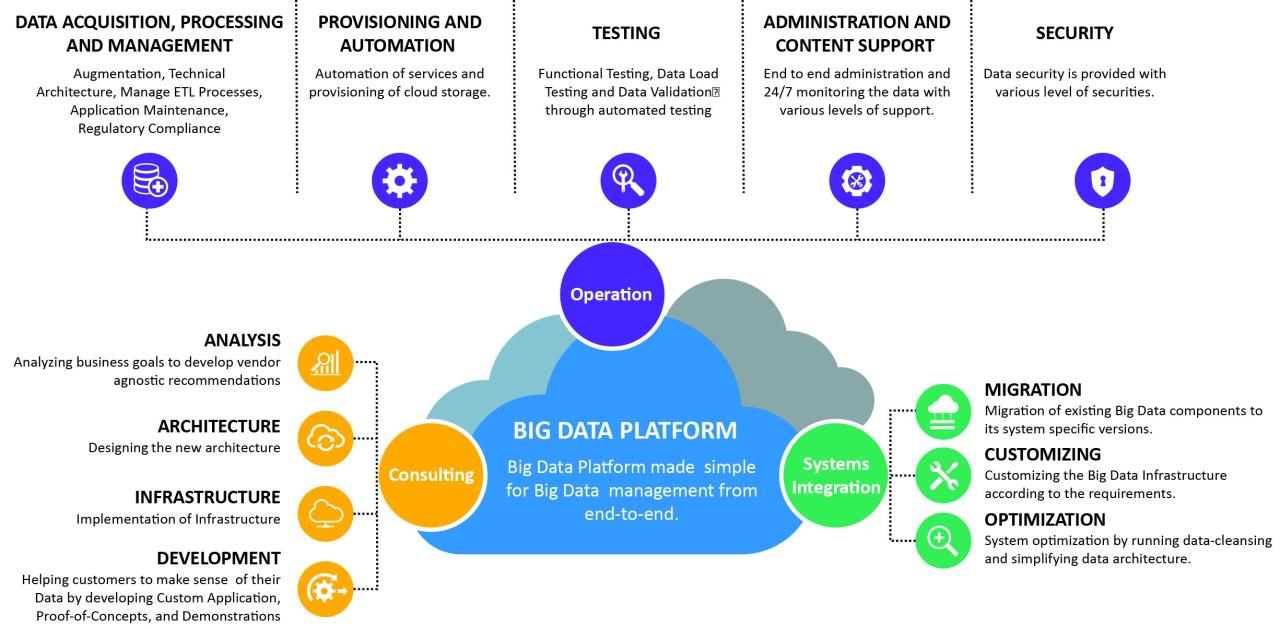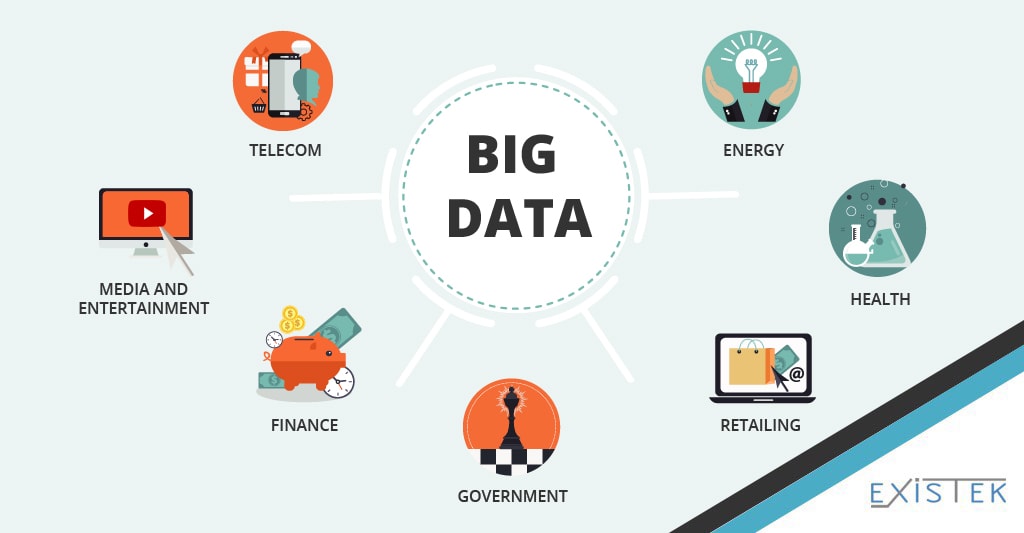Introduction

Big Data Solutions – In today’s digital age, businesses generate vast amounts of data from various sources, including transactions, social media, sensors, and customer interactions. Harnessing this “Big Data” effectively is crucial for organizations seeking to gain competitive advantages.
Big Data Solutions encompass technologies and techniques designed to manage, process, and analyze large and complex datasets. These solutions enable businesses to extract valuable insights from data, make informed decisions, and optimize operations.
Challenges in Big Data Management
While Big Data offers immense potential, its management and processing present significant challenges:
- Volume:The sheer size of Big Data can strain traditional data storage and processing systems.
- Variety:Big Data comes in various formats, including structured, semi-structured, and unstructured data, requiring specialized tools and techniques for analysis.
- Velocity:Big Data is often generated in real-time or near real-time, necessitating solutions that can handle high-speed data ingestion and processing.
- Veracity:Ensuring the accuracy and reliability of Big Data is crucial, as poor-quality data can lead to incorrect insights and decision-making.
- Value:Extracting meaningful insights from Big Data requires sophisticated analytics techniques and domain expertise.
Types of Big Data Solutions
Organizations can choose from a range of Big Data Solutions to meet their specific needs. These solutions vary in their capabilities, advantages, and disadvantages.
Some of the most common types of Big Data Solutions include:
Hadoop
- An open-source framework for storing and processing large datasets across distributed computers.
- Provides high scalability, fault tolerance, and cost-effectiveness.
- Suitable for batch processing and data analysis tasks.
Spark
- A fast and general-purpose computing engine for large-scale data processing.
- Offers in-memory processing, real-time stream processing, and machine learning capabilities.
- Suitable for interactive data exploration, real-time analytics, and machine learning applications.
NoSQL Databases
- Non-relational databases designed to handle large volumes of unstructured and semi-structured data.
- Provide high scalability, flexibility, and performance.
- Suitable for applications that require fast data access and high data throughput.
Data Analytics and Visualization
Big Data Solutions play a pivotal role in data analytics and visualization, empowering businesses with the ability to extract meaningful insights from vast and complex data sets. These solutions leverage advanced algorithms and techniques to analyze and interpret data, enabling organizations to make data-driven decisions and optimize their operations.
Example: Business Intelligence Dashboards
Businesses utilize Big Data Solutions to create interactive dashboards that provide real-time insights into key performance indicators (KPIs). These dashboards leverage data visualization techniques, such as charts, graphs, and heat maps, to present complex data in an easily digestible format.
By monitoring these dashboards, decision-makers can quickly identify trends, patterns, and anomalies, enabling them to make informed decisions and respond to market changes promptly.
Example: Predictive Analytics
Big Data Solutions empower businesses with predictive analytics capabilities. By analyzing historical data and identifying patterns, businesses can forecast future trends and make data-driven predictions. For instance, a retail company can leverage Big Data to predict customer demand for specific products based on factors such as seasonality, demographics, and past purchase behavior.
This information enables businesses to optimize their inventory management and marketing strategies.
Example: Data-Driven Marketing, Big Data Solutions
Big Data Solutions have revolutionized marketing by providing businesses with the ability to segment their customer base and target specific audiences with personalized campaigns. By analyzing customer data, businesses can identify customer preferences, behaviors, and purchase history. This enables them to create highly targeted marketing campaigns that resonate with each customer segment, resulting in increased conversion rates and customer satisfaction.
Future Trends: Big Data Solutions

The future of Big Data Solutions is bright, with many emerging trends that have the potential to revolutionize the way businesses collect, manage, and analyze data. Two of the most important trends to watch are the rise of cloud computing and artificial intelligence.
Cloud computing is making it easier for businesses of all sizes to access and use Big Data Solutions. Cloud-based Big Data platforms provide businesses with the scalability, flexibility, and cost-effectiveness they need to manage and analyze large amounts of data.
Artificial intelligence (AI) is another important trend that is having a major impact on Big Data Solutions. AI-powered tools can be used to automate many of the tasks involved in Big Data management and analysis, such as data cleaning, feature engineering, and model building.
This can free up data scientists to focus on more strategic tasks, such as developing new insights and solutions.
Potential Impact on Businesses
The rise of cloud computing and AI is having a major impact on businesses. Businesses are using these technologies to improve their operations, make better decisions, and gain a competitive advantage.
- Cloud computing is making it easier for businesses to access and use Big Data Solutions. This is allowing businesses to gain insights from their data that they would not have been able to access before.
- AI is helping businesses to automate many of the tasks involved in Big Data management and analysis. This is freeing up data scientists to focus on more strategic tasks, such as developing new insights and solutions.
Data Management Strategies
The rise of cloud computing and AI is also having a major impact on data management strategies. Businesses need to develop new strategies for managing and analyzing data in the cloud and using AI to automate tasks.
- Businesses need to develop new strategies for managing data in the cloud. This includes developing policies for data security, data governance, and data retention.
- Businesses need to develop new strategies for using AI to automate tasks. This includes developing policies for AI ethics and AI governance.